- Home
- John Jakes
The Bold Frontier Page 10
The Bold Frontier Read online
Page 10
Gashlin remained. He was crawling down the opposite side of the tender, hidden from view. Rome edged his way back into the cab, his nerves strained. Fear gnawed the pit of his stomach. He pulled the throttle all the way out and felt the locomotive shiver. Imperceptibly, it picked up speed.
He waited.
Gashlin appeared at the far corner of the tender and hurled the package toward the boiler opening. Rome stepped out of the shadows, grabbing for it. His fingers strained for it, and he wanted to scream with rage when he missed it; he felt the thing brush past his fingertips as the locomotive rocketed onto the trestle.
Gashlin was struggling to get a pistol out of his coat. The dynamite went spiraling into the maw of the firebox. Acting more by instinct than from thought, Rome ran forward, smashing into Gashlin and pushing him backward off the train. Rome tumbled with him for seemingly endless seconds, down and down, through rain and blackness.
Rome thought, My God, we may be falling into the cut, we may …
He hit the ground and felt his body vibrate with the jarring pain. The locomotive rolled a thousand feet beyond the trestle, the last flatcar careening wildly, before it blew to pieces.
Rome flattened himself on the sodden ground, hiding his face. Heat and steam and tiny shards of metal stung his back. He lay there, his heart thumping rapidly while the reverberations died away. Then he staggered to his feet and surveyed the situation.
The trestle remained intact with only a few lengths of rail ruined. The switch engine had disintegrated. The flatcars lay on their sides, rails and ties spilled onto the shoulders of the roadbed. Rome peered at them in the murk and then he thought of Gashlin.
Gashlin lay half a dozen yards away, face up, unconscious. Rome knelt near him, taking a match from his pants pocket. Then he realized that he still held his gun in his left hand. He shifted it to the right, then stuck it in his belt, laughing at his own clumsiness. He finally got the match lit and cupped his hands around it, shielding it from the rain.
He stared at Gashlin. The man’s face was bearded and weary-looking. The strain must have worn him to nothing. His business sliding out from under him, making this one attempt to save it …
Suddenly Rome thought of Job Thompson. Anger flooding over him, he pulled his gun. Standing up, he pointed the barrel at Gashlin’s head, his finger tightening on the trigger.
He stood that way for a long moment, the rain whispering down through the timber surrounding him. Then he scowled. Slowly he pushed the gun back into his belt. Bending down, he hoisted Gashlin’s unconscious form onto his shoulder and began to trudge westward.
Ten minutes later he met a handcar coming toward him from the end-of-track. Thankfully he dumped Gashlin’s body onto the car and huddled down beside it. One of the railroadmen pumped the car back west while the other workers trudged to look over the wreckage.
In the lighted work area, where men labored in the flaring glow of lanterns hung on poles beside the track, Rome met a tired Ben Hamilton. Quickly he explained what had happened. As he was finishing the story, the sheriff rode in.
“This here’s Mark Rome,” Hamilton said.
The sheriff reached for his gun. Rome, faster, already had him under his sights.
“Easy, sheriff,” Rome said. “I want to get this cleared up as much as you do. That’s Bruce Gashlin on the ground. He just blew up one of our switch engines and tried to dynamite our trestle on top of it. He killed Job Thompson—that is, Cole Yancey did, on his orders.”
“I don’t figure it,” the sheriff said. “Not any of it.”
“Wait till he wakes up,” Rome said. “Things’ll straighten out then.”
At least he hoped they would. He was counting on Gashlin being the opportunist in any situation.
In the rain, Rome shivered. A ring of men had gathered, watching intently. Hamilton ordered them back to work and they tramped away through the mud. Slowly, Gashlin stirred on the ground, opened his eyes. The first thing he saw was Rome’s gun.
Next his gaze fastened on the sheriff. He tried to get to his feet, slipped in the mud, and sank to one knee.
“Get up, Gashlin,” Rome said.
He tried again, swaying until he made it.
Rome weighed his words with care, hoping he had judged the man correctly. “We’ve got you dead to rights for dynamiting the engine and for having Job Thompson killed. You can take your chances and keep quiet, or you can spill the whole thing and maybe you’ll get off easier. Prison’s better than a rope.”
Gashlin didn’t wait five seconds; he told his story. Rome noticed that his eyes moved continually as he did so. Stalling for time?
At the end, the sheriff fumbled to pull manacles from his pocket.
Rome was watching for the play. It came as the sheriff stepped between him and Gashlin. There was a flurry of movement. Hamilton shouted, and the sheriff jerked aside, howling in pain, clutching his hip. Teeth bared, Gashlin faced them, the knife shining for a moment until the rain washed the blood off. The sheath under his arm had a broken lace and dangled loosely by his belt.
Gashlin’s arm started back, his eyes filling with hate for Rome. The arm lashed upward; Rome pulled the trigger once; the knife dropped.
Gashlin toppled forward. His arms moved out feebly in an effort to stop the fall. The last chance, Rome thought sourly. Gashlin fell facedown in the mud, quivered, and flopped over onto his back. His face hardened into a mud-daubed mask.
Hamilton was helping the sheriff. Rome tossed his gun away, feeling incredibly tired.
“Go to bed, Mark,” Hamilton said over his shoulder. Rome nodded dumbly, rubbing his eyes. The collective exhaustion of the last few days hit him all at once, but he made it to one of the tents. Somehow he managed to find blankets and a dry spot on top of some pine boards.
When he woke up nearly twenty hours later, the railroad had moved on.
It continued to move, after time for the men to rest. During that interval, Rome saw the sheriff, answered a few last questions, and rode out of Warknife, a free man.
He stopped at the Circle JT. Mrs. Thompson welcomed him quietly, then left him and Cathy alone in the parlor.
“Well, you’ll be moving on, won’t you?” she said.
He nodded. “Guess I will.”
She touched his arm. “To say I’m sorry isn’t enough.”
“You don’t have to say anything, Cathy.”
“Do you think”—she hesitated—”you’ll ever get railroading out of your blood?”
“Someday, maybe. A man has got to settle sometime. The railroad will need an agent here to handle all the cattle shipments.”
“It would be a good place,” she agreed, and he smiled inwardly. Intuitively, silently, an understanding had sprung up between them. The old affection could be rekindled. …
“But I’ve got to do this job first,” he told her. “I’ve got to see the Kansas & Western finished.”
“I know. I’ll still be here.”
“Then I’ll be back. It’s a promise.”
He kissed her in the doorway of the ranch house. She clung to him for a moment, then gently pushed him away.
“Go on, Mark,” she said quietly. “The railroad’s waiting.”
He squeezed her hand and walked to his horse. He waved as he rode out of the yard.
The country was tinted with the light of early evening, and somewhere to the west men labored and cursed to meet the deadline. Slowly, inevitably, the bands were joining the oceans, and he was part of that conquest of immense distance. The iron horse. The eternal pioneers moving forward, sometimes clumsily, haltingly, but still forward.
Spurring his mount, he rode toward the burning ball of the sun, to where the end-of-track lay waiting.
A Duel of Magicians
APRIL BROUGHT THE CROWS and the redbirds. Any shower brought a profusion of hoptoads afterward. The sweet blooming fecundity of the spring embittered Charles Main unreasonably. He slept deeply at night, and had many dreams. He had never f
elt so tired or hopeless. Conversation among the three men had long ago diminished to the minimum necessary to convey a question or the day’s plan.
One morning, early, they spied the distant mass of the southern buffalo herd, returning north with the warm weather. They rode hard and reached the herd in two hours. They killed one cow, gorged themselves on fresh roasted meat, and packed all they would be able to eat before spoilage. Buzzards kept them company, awaiting their departure.
The ride to the buffalo reminded Charles again of the vastness of the Territory. A whole army corps could be maneuvering and they might miss it. He’d convinced himself that he could search the Territory as you’d search a room. He was desperate; he had to think that way. Now he saw the foolishness of it. He was thinking more realistically. That befitted a man who’d partnered with the Jackson Trading Company, but it whittled away his hope.
The mood of his companions didn’t help. Magee was morose because of the Delaware woman, and Gray Owl because he couldn’t guide them with any success. He was failing in his life’s purpose.
They rode for hours without speaking, each man sunk into himself. The Wichitas rose in the south like monuments in a flat field. Wending across the lower slopes of the western side, they found abundant sign. A large number of Indians had pitched their tipis about a week ago. So many Indians—several hundred by Charles’s estimate—that time and weather had not yet been able to erase all the traces.
After they camped that night, Charles went searching on foot in the sparkling dewy morning. He discovered a rusted trade kettle which he picked up and pressed with his thumb, immediately making a hole in the thin rust. It was an impoverished village that had camped here.
Gray Owl trudged up. “Come see this,” he said.
Charles followed him down to the base of the peak to a set of travois pole tracks that had survived. He knelt to study them. Between the pole tracks he saw the prints of wide moccasined feet. He brushed his fingers lightly over one print, half obliterating it. The print belonged to a woman, and a heavy one; no man would pull a travois.
Charles pushed his black hat back and said what Gray Owl already knew. “There are no more dogs. They’ve eaten them. They’re starving. They didn’t move because they wanted to; they’re in flight. From here they could logically go south. Or west, to Texas. Maybe all the way into the llano.”
Gray Owl knew the llano—the staked plains; a scrubby, inhospitable wilderness. “West,” he said, nodding.
They rode with a little more energy. Here at last was a large group of people, one or more of whom might have seen a white man and a boy. Charles knew the odds against it but at least it was a crumb. Until now, they’d been starving.
The sign of so large a migration was easy to follow. They tracked the village to the North Fork of the Red, then northwestward along it for a day and a half. Suddenly there was confusing sign. The remains of another encampment and, across the river, trampled hoof-marked earth, which showed that a second large body of Indians had joined the first.
Gray Owl left for a day, scouting north and east. He returned at a gallop. “All moved east from here,” he said. His skin was free of sweat despite his blanket and the hot spring day.
Magee used his nail to scratch bird droppings from his derby. “Don’t make sense. The forts are east.”
“Nevertheless, that is the way.”
Charles had a hunch. “Let’s go up the river a while. Let’s see if all of them rode east.”
Next morning they found a campsite where perhaps thirty lodges had stood. The day after that, they found the grandfather.
He was resting in cottonwoods with a few possessions from his medicine bundle—feathers, a claw, a pipe—spread around him. The malevolent odor of a chartered leg seeped from under his buffalo robe. He was old, his skin like wrinkled brown wrapping paper. He knew his death was imminent and showed no fear of the oddly assorted trio. Gray Owl questioned him.
His name was Strong Bird. He told them the reason for the great migration eastward. Some six hundred Cheyennes under chiefs Red Bear, Gray Eyes, and Little Robe had decided to surrender to the soldiers at Camp Wichita rather than die of starvation or face the bullets of the soldiers of General Creeping Panther, who was roaming the Territory sweeping up bands of resisters. The grandfather was part of a group that had bolted with Red Bear after he changed his mind about surrendering.
“Thirty lodges,” he said, his eyes fluttering shut, his voice reedy. “They are eating their horses now.”
“Where, Grandfather?” Gray Owl asked.
“They meant to push up the Sweet Water. Whether they did I don’t know. I know your face, don’t I? You belong to the People.”
Gray Owl seemed heavily burdened. “Once long ago.”
“Age has rotted my flesh. I could not keep up. I asked them to leave me, whether or not the soldiers found me. Will you help me die?”
They hewed down branches and fashioned a burial platform in one of the strongest cottonwoods. Charles carried the old man up to it, with Magee bracing him below. He could barely stand the stench but he got the grandfather settled with his few possessions and left him with warm sun shining on his old face, which was composed and even showed a drowsy smile.
As they rode out, Gray Owl said, “It was a generous thing to help him to the Hanging Road. It was not the deed of the man they named Cheyenne Charlie. The man who wanted to kill many.”
“There’s only one I want now,” Charles said. “I think our luck’s changed. I think we’re going to find him.”
That was his blind hope speaking again. But the sunshine and the springtime buoyed him, and so did the possibility that Red Bear’s band of holdouts might have seen a white man. Gray Owl warned Charles and Magee that Red Bear, now a village chief, was formerly a fierce Red Shield Society chief, which no doubt explained why he’d balked at giving up along with the others.
They found the village far up the Sweet Water’s right bank. The Cheyennes made no effort to hide themselves. Cooking fires smoked the sky at midday and from a rise, through his spyglass, Charles saw several men with raggy animal pelts on their heads shuffling in a great circle around the edge of the encampment. The wind brought the trackers the faint thumping of hand drums.
Magee used the spyglass. Uncharacteristically sharp, he said, “What the hell have they got to dance about? Aren’t they starving to death?”
“Massaum,” Gray Owl said.
“Talk English,” Magee said.
“That’s the name of the ceremony,” Charles said. “They put a painted buffalo skull in a trench to represent the day the buffalo came to earth, and the dancers pretend to be deer and elk and wolves and foxes. The ceremony is a plea for food. The old man said they’re starving.”
Magee rolled his tongue over his upper teeth. “Damn mad about it, too, I guess.”
“You don’t have to go in with me.”
“Oh, sure. I came this far to be a yellow dog, huh? That isn’t the kind of soldier somebody trained me to be.” Staring at Charles’s haggard eyes, at the long pointed beard nearly down to his stomach, Magee suddenly winced. “I’m sorry I sound sore. I just think all this is hopeless. Your boy’s gone, Charles.”
“No he isn’t,” Charles said. “Gray Owl? Go in or stay?”
“Go.” The tracker eyed the village, but not in a comfortable way. “First, load all the guns.”
It was a splendid balmy day. The wrong sort of day for the tragedy of a lost son or a starving belly. The wind floated fluffy clouds overhead and the clouds cast majestic slow-sailing shadows. In and out of the shadows, in single file, the three rode in the Z pattern Jackson had taught Charles.
One of the pelt-clad dancers was first to spy them. He pointed and raised a cry. The drumming stopped. Men and women and children surged toward the side of the camp nearest the strangers. The men were middle-aged or elderly; the warriors were undoubtedly off somewhere searching for food. Well before Charles was within hailing distance, he saw th
e sun flashing from the metal heads of lances and the blades of knives. He also saw that no dogs frolicked anywhere. The tipis were weathered and torn. There was an air of despair about the village beside the Sweet Water.
The wind still blew in their faces. Charles smelled offal, smoke, and sour bodies. He didn’t like all the gaunt angry faces lining up behind the dancers, or the truculent expression of the stout old warrior who strode out to meet them with his eight-foot red lance and his round red buffalo-hide shield. The horns of his headdress were red but faded; he had distinguished himself in war many winters past.
Charles held his hand palm outward and spoke in their language.
“We are peaceful.”
“You are hunters?”
“No. We are searching for a small boy, my son.” That touched off whispers among some of the grandmothers. Magee caught it too, raising an eyebrow. Those starved old women with their watering eyes acted as if they knew who Charles was talking about. “May we come into the village a while?”
Chief Red Bear thrust his shield out. “No. I know that man beside you. He turned his face from the People to go and help the white devils of the forts. I know you, Gray Owl,” he exclaimed, shaking his shield and lance. One of the dancers with a scrap of pelt on his head sank to a half-crouch, his knife moving in a small provocative circle.
“You are soldiers,” the chief said.
“We are not, Red Bear—” Gray Owl began.
The chief pointed his lance at the trackers and shouted: “Soldiers. Call Whistling Snake from the Massaum lodge.”
Magee brought up his Spencer from the saddle where he’d been resting. “Don’t,” Charles said in English. “One shot and they’ll tear us up.”
“ ’Pears they’ll do it anyway.” There was a slight quaver in Magee’s voice; Charles feared that what he said was so. More than a hundred people confronted them. In terms of physical strength each of the Cheyennes was no match. Hunger had shrunk them and age enfeebled them. Numerically, however, they had the fight won before it started.

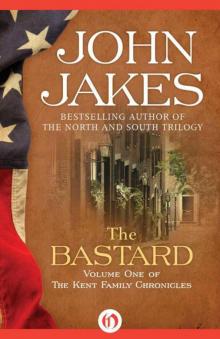 The Bastard
The Bastard The Furies
The Furies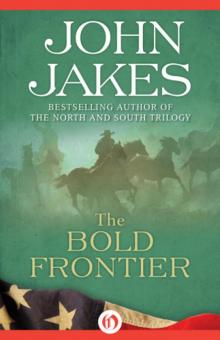 The Bold Frontier
The Bold Frontier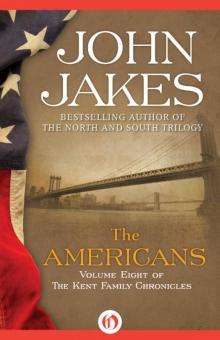 The Americans
The Americans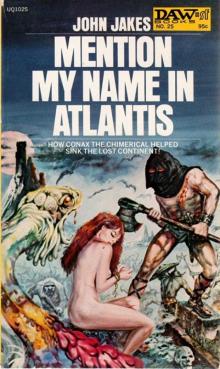 Mention My Name in Atlantis
Mention My Name in Atlantis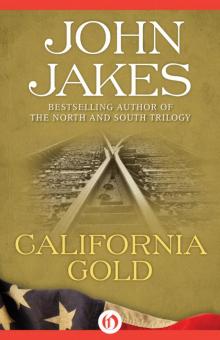 California Gold
California Gold North and South
North and South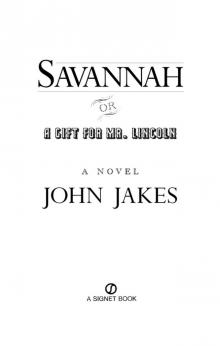 Savannah, or a Gift for Mr. Lincoln
Savannah, or a Gift for Mr. Lincoln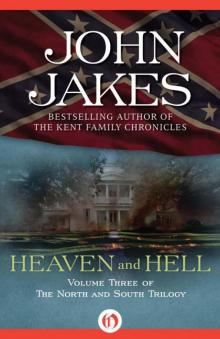 Heaven and Hell
Heaven and Hell Homeland
Homeland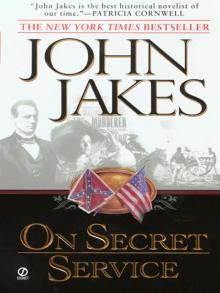 On Secret Service
On Secret Service The Lawless
The Lawless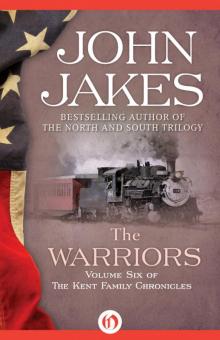 The Titans
The Titans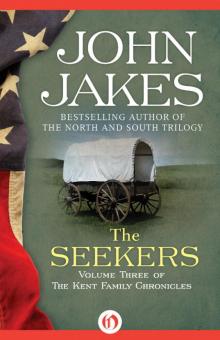 The Seekers
The Seekers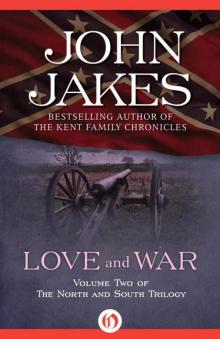 Love and War
Love and War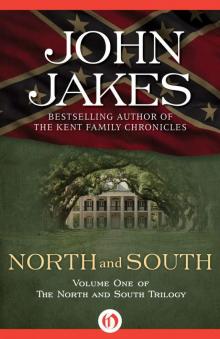 North and South: The North and South Trilogy (Book One)
North and South: The North and South Trilogy (Book One)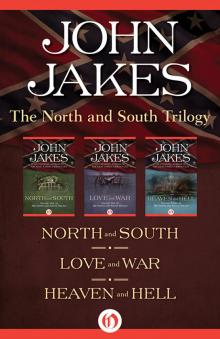 North and South Trilogy
North and South Trilogy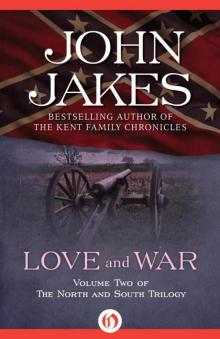 Love and War: The North and South Trilogy
Love and War: The North and South Trilogy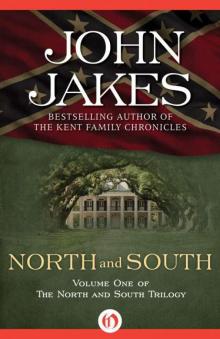 North and South: The North and South Trilogy
North and South: The North and South Trilogy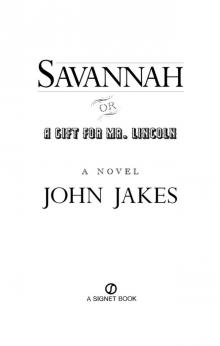 Savannah
Savannah Lawless
Lawless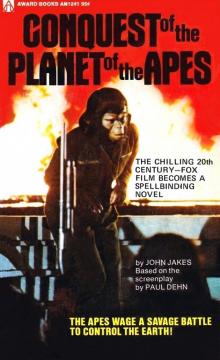 Conquest Of The Planet Of The Apes
Conquest Of The Planet Of The Apes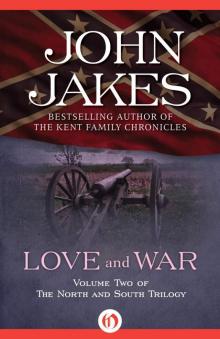 Love and War: The North and South Trilogy (Book Two)
Love and War: The North and South Trilogy (Book Two)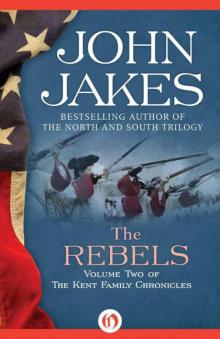 The Rebels: The Kent Family Chronicles
The Rebels: The Kent Family Chronicles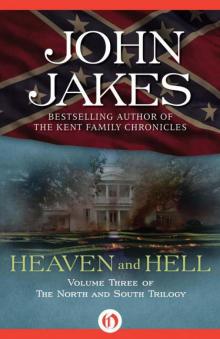 Heaven and Hell: The North and South Trilogy
Heaven and Hell: The North and South Trilogy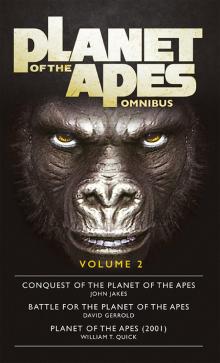 Planet of the Apes Omnibus 2
Planet of the Apes Omnibus 2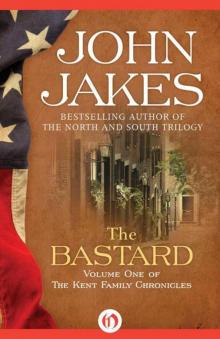 The Bastard: The Kent Family Chronicles
The Bastard: The Kent Family Chronicles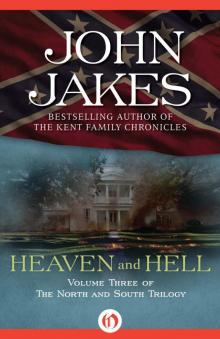 Heaven and Hell: The North and South Trilogy (Book Three)
Heaven and Hell: The North and South Trilogy (Book Three)